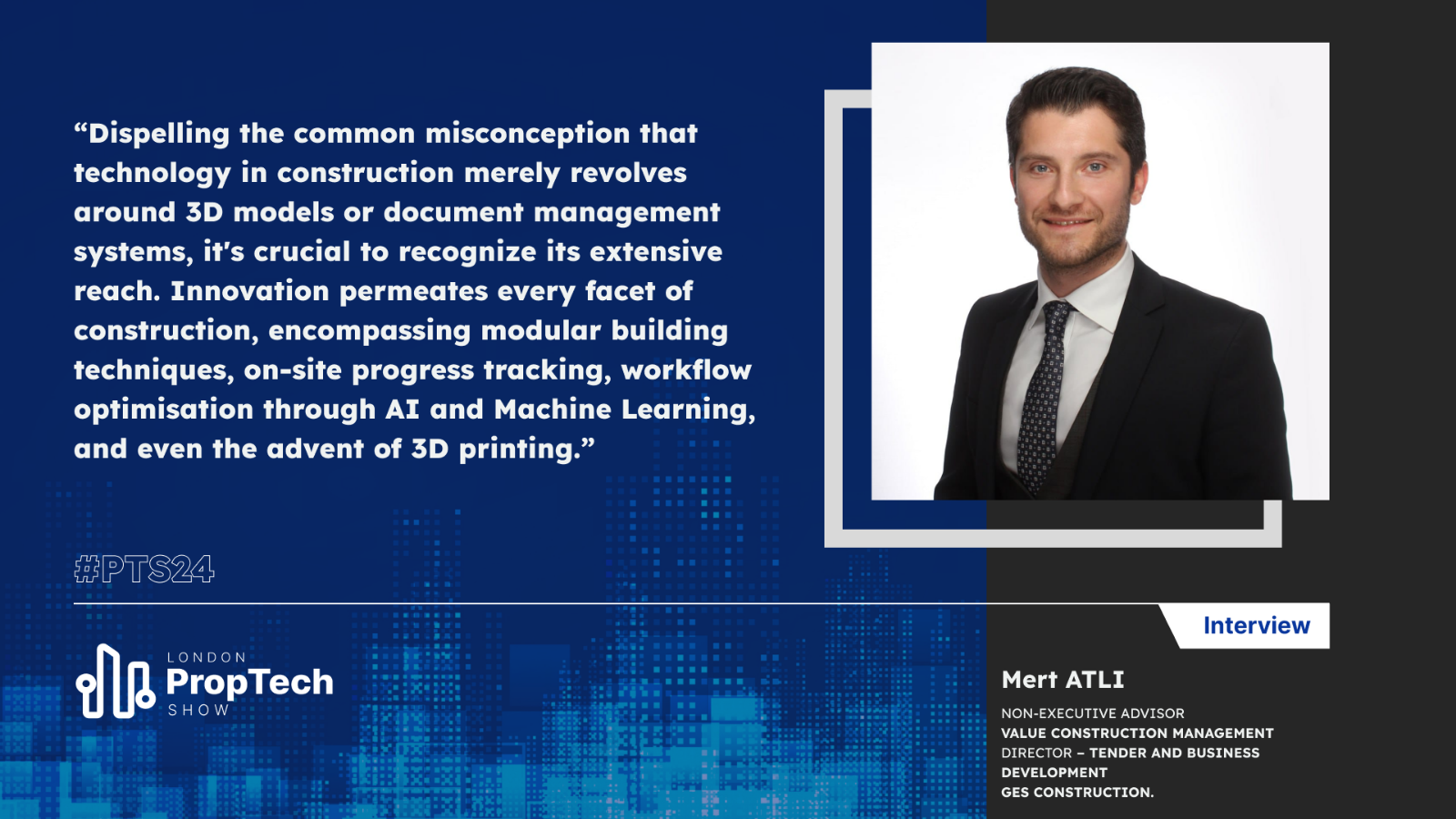We are delighted to present a captivating Q&A Session featuring Mert ATLI, the esteemed Non-Executive Advisor of Value Construction Management and Director – Tender and Business Development at GES Construction. With over 15 years of extensive expertise, Mert has consistently delivered excellence in capital building construction projects across the project lifecycle. His contributions span pivotal roles within consultants and contractors, showcasing a wealth of experience in business development, tender management, HR oversight, risk mitigation, procurement, cost, commercial, and project management.
Join us as we delve into Mert ATLI's wealth of knowledge and glean insights from his vast experience in the dynamic realms of construction and project management.
#PTS: As a prominent figure in construction technology, how do you perceive the evolution of construction innovation over the last few years? Have you noticed any significant trends or breakthroughs that are reshaping the industry?
#Mert ATLI: The recent years have witnessed a remarkable evolution in construction technology, a response to the challenges posed by global economic uncertainties, pandemics, political conflicts, and natural disasters. Both the public and private sectors are navigating budget constraints, while contractors face intense competition with narrowing profit margins. In this landscape, technological advancements emerge as a pivotal force, bridging financial gaps and enhancing overall efficiency.
Dispelling the common misconception that technology in construction merely revolves around 3D models or document management systems, it's crucial to recognize its extensive reach. Innovation permeates every facet of construction, encompassing modular building techniques, on-site progress tracking, workflow optimisation through AI and Machine Learning, and even the advent of 3D printing. The industry is undergoing a transformative shift, with technology becoming a pervasive topic of discussion.
One notable breakthrough that stands out for me is the concerted effort to establish a unified data environment connecting all aspects of construction. This pragmatic advancement, despite its costs, proves to have a substantial impact, making it a key milestone in the industry's technological journey.
#PTS: With your experience in running a cost/project management consultancy on a global scale, how do you see the role of technology in optimising project management strategies? Are there specific technological advancements that have greatly impacted project efficiency?
#Mert ATLI: Over the years in the industry, I've witnessed a significant transformation in the role of technology in optimising project management strategies. Technology serves as a catalyst for enhanced efficiency, addressing the complexities inherent in large-scale projects. One notable advancement is the integration of cloud-based project management platforms, facilitating seamless collaboration and real-time data accessibility. Additionally, Building Information Modelling (BIM) has emerged as a game-changer, offering a comprehensive and integrated approach to project design and execution. We take every chance to improve the efficiency of our services in the project/cost management part and rely on cloud-based platforms to navigate through piles of documentation with our colleagues in different regions.
#PTS: Considering your expertise, cultural differences often influence project execution in construction. How do you navigate and manage cross-cultural teams to ensure effective collaboration and project success in a global context?
#Mert ATLI: The influence of cultural differences on project execution in construction is undeniable, especially when operating on a global scale. Managing cross-cultural teams requires a nuanced approach that prioritises effective collaboration and ensures project success. One key strategy involves fostering a culture of open communication and mutual understanding. Establishing clear communication channels helps bridge language and cultural gaps, creating an environment where diverse perspectives are valued.
Equally important is investing in cultural competency training for team members, fostering awareness and respect for different working styles and communication norms. This proactive approach goes a long way in preventing misunderstandings and promoting a harmonious working atmosphere.
Implementing technology solutions that facilitate virtual collaboration is another essential aspect. Leveraging project management tools, virtual meetings, and collaborative platforms helps overcome geographical barriers and ensures that the team remains connected and aligned despite diverse locations.
Ultimately, successful navigation of cultural differences hinges on a combination of effective communication, cultural sensitivity, and leveraging technology to create a cohesive and collaborative global team.
#PTS: London stands as a hub for construction development. From your point, how is construction technology shaping the future of London's infrastructure and urban landscape?
#Mert ATLI: Although I'm not currently based in London, I closely monitor the developments in the region, particularly in how construction technology is influencing the future of London's infrastructure and urban landscape. From my observation, London remains a focal point for innovative construction practices that are reshaping the city's skyline and functionality.
Smart infrastructure solutions continue to play a crucial role in London's development, fostering efficiency and sustainability. The integration of technology, such as intelligent transportation systems and connected buildings, contributes to a more interconnected and forward-thinking urban environment.
The role of data-driven decision-making, powered by artificial intelligence and analytics, is probably optimising resource allocation and project management, aligning construction projects with the ever-changing needs of the city. In this respect, I admire what Laminar Projects does and their overall philosophy.
Despite not being physically present, it's clear that construction technology continues to be a driving force in shaping London's future, making it an exciting space to watch for innovative developments in infrastructure and urban planning.
#PTS: How do events like the London PropTech Show impact construction technology and collaborations in London?
#Mert ATLI: In my opinion, events like the London PropTech Show significantly influence construction technology and collaborations in the city by providing a platform for industry players to showcase innovations, share insights, and foster partnerships. These gatherings stimulate dialogue, accelerate technological adoption, and contribute to a more connected and innovative construction ecosystem in London.

